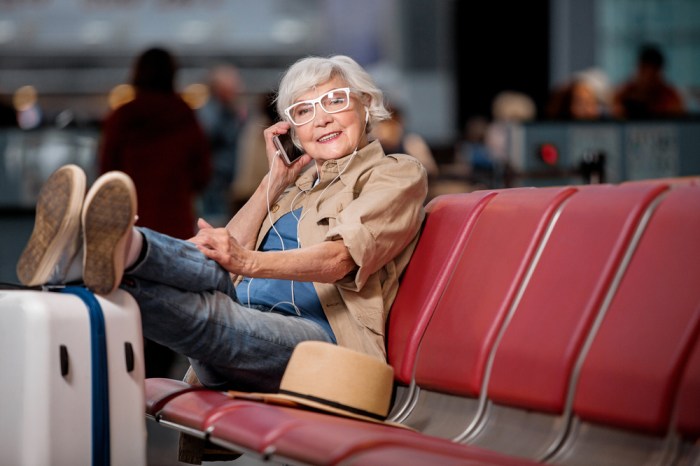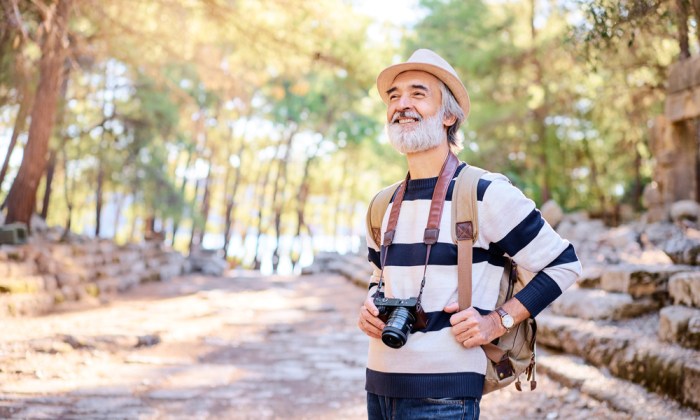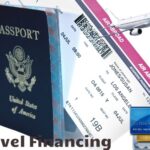Senior Solo Travel: Embarking on a solo adventure later in life offers unparalleled freedom and self-discovery. This comprehensive guide navigates the practicalities and pleasures of independent travel for seniors, addressing everything from choosing the perfect destination to mastering the art of solo exploration. We delve into essential planning, health and safety considerations, budgeting strategies, and cultural immersion techniques, ensuring a journey that’s both enriching and secure.
From meticulously crafted itineraries and expert tips on booking flights and accommodations to insightful advice on managing finances and staying connected with loved ones, this guide empowers seniors to confidently embrace the transformative experience of solo travel. We explore diverse destinations tailored to the needs of older adults, emphasizing accessibility, safety, and cultural immersion. Ultimately, we aim to inspire and equip seniors to create unforgettable memories while traveling independently.
Health and Safety Considerations: Senior Solo Travel
Embarking on solo travel as a senior presents unique opportunities for personal growth and exploration, but careful planning regarding health and safety is paramount. Prioritizing well-being before, during, and after the trip minimizes potential risks and maximizes the enjoyment of the experience. This section details strategies for maintaining physical and mental health, addresses potential health risks, and Artikels resources for accessing healthcare while traveling abroad.
Maintaining Physical and Mental Well-being
Maintaining physical and mental well-being during solo travel requires proactive measures. Regular exercise, even simple activities like daily walks, helps combat the sedentary nature of some travel. Packing familiar comfort items, such as a favorite pillow or book, can mitigate feelings of isolation or homesickness. Staying connected with loved ones through regular communication helps maintain social ties and provides a sense of security.
Furthermore, incorporating mindfulness techniques, such as meditation or deep breathing exercises, can manage stress and promote relaxation. For seniors with pre-existing conditions, adherence to prescribed medication schedules and carrying sufficient supplies is crucial. Consulting with a physician before travel to discuss any necessary vaccinations or health precautions is also highly recommended.
Potential Health Risks and Preventative Measures
Several health risks are associated with senior solo travel. These include falls, exacerbated by unfamiliar environments and potentially uneven terrain. Preventative measures include wearing comfortable, supportive footwear, using walking sticks or canes if needed, and being mindful of uneven surfaces. Another concern is dehydration, particularly in hot climates. Staying hydrated by drinking plenty of water throughout the day, avoiding excessive alcohol consumption, and recognizing the early signs of dehydration are essential.
Additionally, seniors are more susceptible to infectious diseases. Practicing good hygiene, such as frequent handwashing, and staying up-to-date on vaccinations can significantly reduce the risk. Foodborne illnesses are another concern; choosing well-cooked foods and avoiding raw or undercooked items minimizes this risk.
Accessing Healthcare Services Abroad
Accessing healthcare services in a foreign country requires careful planning. Before departure, travelers should obtain comprehensive travel insurance that covers medical emergencies and evacuations. This insurance should include details on how to access emergency medical services in the destination country. It’s also advisable to carry a copy of your medical history, a list of current medications, and any relevant allergies.
Knowing the location of the nearest hospital or clinic in your destination is important, as is having a method of contacting emergency services. Familiarizing oneself with local emergency numbers and procedures can be crucial in a medical emergency. Consider carrying a translation app or phrasebook to aid communication with healthcare providers.
Utilizing Senior-Focused Travel Groups or Companion Services
Joining a senior-focused travel group or using a travel companion service offers several benefits, particularly for those traveling alone. These services provide built-in social interaction, reducing feelings of isolation and providing a sense of community. Group travel often includes organized excursions and activities, eliminating the need for independent planning and navigation. Companion services offer assistance with tasks such as luggage handling and navigation, reducing physical strain and stress.
Furthermore, these services often include built-in safety nets, such as 24/7 support and emergency contact numbers. The added security and support provided can significantly enhance the travel experience for senior solo travelers.
Budgeting and Financial Aspects

Planning a financially responsible solo trip as a senior requires meticulous budgeting and a proactive approach to managing funds. Failing to account for all expenses can quickly derail even the most meticulously planned adventure. This section Artikels strategies for creating a realistic budget and maintaining financial security throughout your journey.
Creating a Realistic Budget
Developing a comprehensive budget involves carefully considering all potential expenses. Begin by estimating costs for accommodation, factoring in options ranging from budget-friendly hostels or guesthouses to mid-range hotels or Airbnb rentals. Transportation costs should encompass flights, ground transportation (trains, buses, taxis, or rental cars), and any potential tolls or parking fees. Allocate funds for planned activities, such as museum entries, guided tours, or participation in local events.
Finally, remember to budget for daily meals, considering the cost of groceries if self-catering, or restaurant meals if dining out is preferred. A detailed spreadsheet or budgeting app can prove invaluable in tracking expenses and ensuring you stay within your allocated budget. For example, a two-week trip to Europe might necessitate a budget of $3,000-$5,000 depending on the level of comfort and the chosen destinations.
A similar trip within the United States could range from $2,000-$4,000. These are rough estimates, and the actual cost will vary depending on the traveler’s spending habits and chosen destinations.
Cost-Effective Travel Options for Seniors
Several strategies can help seniors travel affordably. Consider off-season travel to avoid peak pricing on flights and accommodations. Traveling during weekdays often yields lower fares than weekend travel. Utilizing public transportation whenever possible can significantly reduce transportation costs compared to taxis or rental cars. Many cities offer senior discounts on attractions, museums, and transportation, which should be actively sought.
For accommodation, explore budget-friendly options such as hostels (many offer private rooms), guesthouses, or Airbnb rentals, often offering more affordable rates than hotels. Packing light can also reduce baggage fees and the need for expensive checked luggage. For example, utilizing senior rail passes in Europe can dramatically reduce train travel expenses. Similarly, many national parks in the US offer senior discounts on entry fees.
Managing Finances Securely During Solo Travel
Security is paramount when traveling alone. Before departure, notify your bank and credit card companies of your travel dates and destinations to prevent your cards from being blocked due to unusual activity. Carry multiple credit cards and debit cards, keeping some in separate locations for added security. Consider using a travel money card for smaller purchases, offering a layer of protection against theft.
Avoid displaying large amounts of cash and utilize ATMs in well-lit, public areas during daylight hours. Keep a detailed record of your financial transactions, including receipts and copies of important documents, either physically or digitally stored in a secure cloud-based system. Consider purchasing travel insurance that includes coverage for medical emergencies, lost luggage, and trip cancellations. In the event of theft or loss, promptly report it to the local authorities and your financial institutions.
For instance, a travel wallet with RFID blocking technology can help protect against electronic theft.
Social and Cultural Engagement

Senior solo travel presents a unique opportunity for deep cultural immersion, fostering personal growth and enriching life experiences. However, navigating a new environment alone requires proactive strategies to engage meaningfully with local communities while mitigating potential feelings of isolation. Successfully managing this aspect of solo travel enhances the overall journey, transforming it from a solitary adventure into a rewarding and connected experience.Successfully engaging with local cultures requires sensitivity and respect.
This involves understanding and adhering to local customs and etiquette, demonstrating a genuine interest in learning about the community’s history, traditions, and way of life. Avoidance of culturally insensitive behaviors is paramount, ensuring a positive interaction and a respectful exchange.
Respectful Cultural Interaction Strategies, Senior Solo Travel
Active participation in local events, such as festivals or markets, provides a natural entry point for cultural engagement. Observing local customs, such as greetings or dining etiquette, shows respect and facilitates connection. Engaging in conversations with locals, when appropriate, can lead to unexpected insights and friendships. For example, striking up a conversation with a shopkeeper about local produce or crafts can lead to meaningful interactions and a deeper understanding of the local economy and lifestyle.
Similarly, attending a local religious ceremony, after careful research to understand appropriate attire and behavior, offers a profound insight into the community’s spiritual life. Remember to always be mindful of personal space and avoid intrusive behavior.
Combating Loneliness and Isolation
Loneliness is a potential challenge for solo travelers, particularly seniors. Proactive strategies are essential for mitigating this. Participating in organized tours or group activities provides opportunities for social interaction and shared experiences. Joining walking tours or taking cooking classes, for instance, can facilitate connections with fellow travelers and locals alike. Utilizing social media platforms or travel forums dedicated to senior travelers can foster a sense of community and provide opportunities to connect with others who share similar interests and travel styles.
For example, many Facebook groups are dedicated to specific travel destinations or interests, offering platforms to share experiences, seek advice, and even arrange meetups.
Connecting with Other Travelers and Locals
Leveraging technology and community resources enhances the ability to connect with others during solo travel. Utilizing hostel common areas, even if not staying overnight, offers a convenient location to meet other travelers. Many hostels actively promote social events, creating opportunities for interaction. Joining a local club or group based on shared interests, such as a book club or hiking group, can lead to lasting friendships and provide valuable insights into local life.
Consider participating in volunteer tourism opportunities; these initiatives offer a chance to contribute meaningfully to the community while connecting with locals who share a common purpose. This type of engagement can lead to rewarding relationships and deeper cultural understanding.
Technology and Communication
For senior solo travelers, leveraging technology is no longer a luxury but a necessity, enhancing safety, navigation, and communication, ultimately enriching the overall travel experience. Smartphones, in particular, have become indispensable tools, offering a range of applications designed to address the unique challenges and opportunities of independent travel for older adults. Effective utilization of these technologies can significantly mitigate risks and foster a more fulfilling journey.Technology offers numerous advantages for senior solo travelers.
GPS navigation apps eliminate the anxieties associated with getting lost in unfamiliar surroundings, while communication tools facilitate seamless contact with loved ones and emergency services. Moreover, various apps provide access to real-time information on local services, transportation options, and potential safety concerns, empowering travelers to make informed decisions and navigate potential challenges proactively. This proactive approach translates to increased peace of mind and a more enjoyable travel experience.
Helpful Apps and Gadgets for Senior Solo Travelers
The selection of appropriate technology can significantly impact a senior solo traveler’s experience. Careful consideration should be given to user-friendliness, functionality, and accessibility features. Prioritizing ease of use is paramount, especially for individuals less familiar with technology.
- GPS Navigation Apps: Google Maps and Apple Maps offer comprehensive navigation features, including offline map downloads for areas with limited connectivity. These apps provide turn-by-turn directions, real-time traffic updates, and alternative route suggestions, making navigation simpler and safer.
- Translation Apps: Google Translate and similar apps can overcome language barriers, allowing for smoother communication with locals and access to information in foreign languages. The ability to translate menus, signs, and conversations can significantly enhance the travel experience.
- Emergency Alert Apps: Many apps provide location sharing and emergency contact features. These can be crucial in the event of an accident or unexpected situation, allowing for rapid response from family or emergency services. Examples include Life360 and similar personal safety apps.
- Medical Information Apps: Apps that store medical history, allergies, and emergency contact information can be lifesavers in medical emergencies. This readily accessible information can be vital for medical professionals providing care.
- Communication Apps: WhatsApp, FaceTime, and Skype allow for convenient and cost-effective communication with family and friends back home. Regular check-ins help maintain a sense of connection and provide reassurance.
Strategies for Staying Connected with Family and Friends
Maintaining regular contact with loved ones is essential for both emotional well-being and safety. A proactive approach to communication minimizes concerns and enhances the sense of security during solo travel.Establishing a consistent communication schedule, even if just a brief daily check-in, can significantly alleviate anxieties for both the traveler and their family. Sharing travel itineraries, including planned activities and accommodation details, ensures loved ones are aware of the traveler’s whereabouts.
This allows for easier contact in case of emergencies and provides reassurance to those at home. Utilizing location-sharing features on smartphones also offers an added layer of security and peace of mind. Regular photo and video updates can help to share the travel experience and maintain a sense of connection.
Senior solo travel, while demanding careful planning, offers immeasurable rewards. By prioritizing safety, embracing flexibility, and cultivating a spirit of adventure, seniors can unlock a world of enriching experiences. This guide serves as a roadmap, empowering individuals to embark on journeys of self-discovery, cultural immersion, and personal growth. The freedom and independence of solo travel at any age are invaluable, and with the right preparation, a fulfilling and unforgettable adventure awaits.

